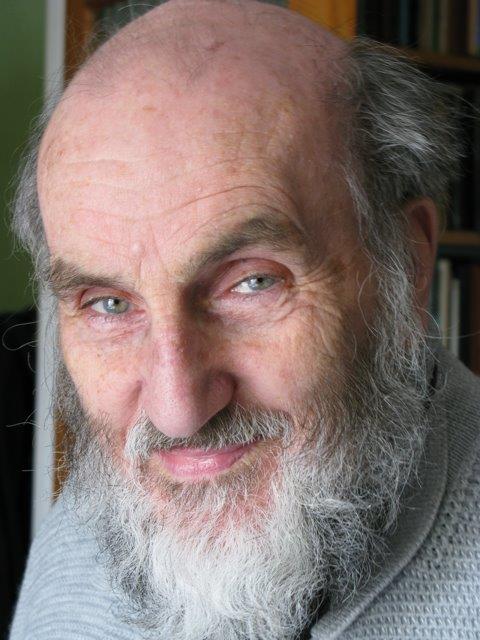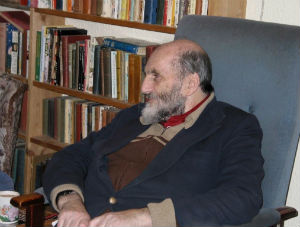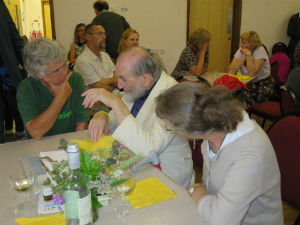The Revd John Roderick Peck: 1924-2016
The Revd John Roderick Peck (BD, ALBC), husband of Hannah Peck (nee Holloway), and a founder of the international Greenbelt Arts Festival, died peacefully in his sleep in Ipswich on July 1, 2016, four days into his 93rd year
 Known for his keen mind, he was one of the UK’s freshest theological thinkers and teachers. He was among those awarded Maundy Money by Her Majesty The Queen in St. Edmundsbury Cathedral on April 9, 2009. Born in London, the son of Albert ‘Bart’ Peck and Amy Bennett Rankin, he is survived by his children: Edith, Michael, James, Dacre, Stephen, and their adopted daughter Vera.
Known for his keen mind, he was one of the UK’s freshest theological thinkers and teachers. He was among those awarded Maundy Money by Her Majesty The Queen in St. Edmundsbury Cathedral on April 9, 2009. Born in London, the son of Albert ‘Bart’ Peck and Amy Bennett Rankin, he is survived by his children: Edith, Michael, James, Dacre, Stephen, and their adopted daughter Vera.
It was by a long and winding road that John Peck grew in wisdom and stature to become what the art historian Karen L. Mulder called ‘the least known best theologian in the world.’ While attending Haberdashers’ Aske’s Boys School, he was awarded a scholarship to Pembroke College Cambridge (Eng. lit., not taken). He ‘came to Christ,’ as he liked to put it, in 1942, when he was 18, and served in World War II as a CO, variously occupied as fireman, horseman, stacker, and thatcher on an agricultural war farm. After the war he joined Friends’ Evangelistic Band (1947-49), which travelled around rural communities preaching the gospel and holding impromptu services in unlikely venues. It was raw itinerant evangelism. The Band were often broke and lived from hand to mouth, at times on eggs and wild mushrooms.
At London Bible College (1949-52), he read Divinity and graduated with honours. Throughout the 1950s, he was at times a correspondence tutor for LBC, a screenprinter, and an evening class lecturer at Birmingham Bible Institute (now Birmingham Christian College). He also spent several periods again with FEB (1952-57). In 1959, John and Hannah (d. 1999) married, and that same year he became minister of the historic Thaxted Baptist Church, which had an association with C. H. Spurgeon in the late 19th century.
After moving with Hannah to Glasgow to accept a position as Senior Lecturer (1965-1978) at the Bible Training Institute (now International Christian College), Peck’s reputation grew as an ‘exceptionally able Christian thinker’ (Geoffrey W. Grogan, Principal, BTI). This was affirmed across the Atlantic in 1985, when Robert E. VanderVennen (Director of Educational Services, Institute for Christian Studies, Toronto) wrote that John had ‘unique capabilities for teaching biblical worldview’ and ‘an exceptional grasp on the Bible in relation to culture and a special gift for teaching and preaching that is not matched in anyone I know.’
Peck’s theological and philosophical insights fuelled the inaugural Greenbelt Festival in 1974. Collaboratively begun on Prospect Farm in Suffolk with 2,000 in attendance, Greenbelt has become an annual benchmark event, fusing the arts, faith, and justice with a rich agenda of music each year and a renowned seminar programme of speakers from many countries and professions. The Shakespearean actor and artistic director James Holloway has said that in many ways ‘the festival has mirrored Peck’s vision of a Christianity that celebrates Christ’s universal mandate to love thy neighbour as thyself. It was story time again, and the parable of “the good outsider” became an artistic and political prerogative.’
In 1977, Peck was asked to form and head what he called ‘an experimental educational project for promoting the study, research, and communication of biblical perspectives in depth to “secular” life, including fostering a coherent biblical philosophy.’ This became College House and was centred in Cambridge, where it also ran classes for the Cambridge Diploma in Religious Studies, offered cutting-edge weekend seminars for professionals, and advised spin-off initiatives in Leicester and London.
 In a 1998 interview, Peck reminisced about The Christian Philosophy of Law, Politics, and the State, a book by Hebden Taylor that deeply influenced him in the 1960s as a Christian thinker. ‘A friend lent me the book,’ he said, ‘for a class on Ethics I had to teach at BTI. It introduced me to “modal theory,” and unlocked so many doors for me.’ It gave Peck biblical tools for shaking off his dualistic thinking, the sacred-secular divide, by introducing him to a philosophy for articulating a Christian perspective across the spectrum of life, from the way we worship to the way we do business, make things, raise children, socialise, grow food, create art, engage politically, do our science, and everything else. As a result, Peck developed a teaching programme for engaging all aspects of life through a biblical prism. All human activity, he believed, must be brought under the scrutiny of the Bible. He would become known in the UK, and in parts of Europe, the US, and Canada as paradigmatic of Christian virtue pursuing intellectual curiosity under the Lordship of Christ.
In a 1998 interview, Peck reminisced about The Christian Philosophy of Law, Politics, and the State, a book by Hebden Taylor that deeply influenced him in the 1960s as a Christian thinker. ‘A friend lent me the book,’ he said, ‘for a class on Ethics I had to teach at BTI. It introduced me to “modal theory,” and unlocked so many doors for me.’ It gave Peck biblical tools for shaking off his dualistic thinking, the sacred-secular divide, by introducing him to a philosophy for articulating a Christian perspective across the spectrum of life, from the way we worship to the way we do business, make things, raise children, socialise, grow food, create art, engage politically, do our science, and everything else. As a result, Peck developed a teaching programme for engaging all aspects of life through a biblical prism. All human activity, he believed, must be brought under the scrutiny of the Bible. He would become known in the UK, and in parts of Europe, the US, and Canada as paradigmatic of Christian virtue pursuing intellectual curiosity under the Lordship of Christ.
Throughout decades of teaching, Peck, a wise paterfamilias, mentored countless students in the UK and overseas, including teaching at and advising the Christian Artists Seminar (the Netherlands). In 1983, he was a visiting lecturer to ICS (Toronto). Many of his advising and mentoring relationships continued into his eighties.
Peck often spoke of the year he spent in the States as a highlight of his life, for both himself and his family. In 1985, he moved with his wife, his mother, Stephen, and Vera to live as scholar-in-residence (Staley Lecturer) for one year at Trinity Church and its Trinity House Theatre and Arts Group (Detroit, Michigan). At Trinity, John taught three semesters of a specially arranged tutorial and integrative learning programme, similar to College House, for the development and communication of a Christian philosophical framework to every area of life. He also created a 4-part video series for students at the University of Michigan, participated in numerous radio programmes, and established relationships with Christian arts communities in Chicago and New York. For the next 20 years he made numerous lecture trips from England to America.
A Baptist minister, John’s irenic personality and approachableness opened many doors of ministry for him across denominational lines. Besides FEB, these included Anglican lay reader, violinist in a Salvationist string band, Quaker deputation speaker, work among Jewish students in London University, and membership of St. Silas Episcopal Church (Glasgow). He was also at times a Methodist local preacher, superintendent of a Congregational Sunday school, youth worker of a Brethren assembly, and lecturer on the Doctrine of the Church and liturgies to mixed groups, including Roman Catholics.
He was for many years an active member of Tyndale Fellowship for Biblical Research, especially its Ethics group, and was part of a study group, chaired by Dr. Oliver Barclay (Cambridge), on the theological foundation of Christian Ethics. He participated in Lausanne ‘80, was active in several Christian education projects with the Baptist Union, and was the first chairman of Open Christian College and served it as a tutor in 1988-89.
Peck appreciated and sought God’s knowledge and wisdom both within and outside the traditional remit of Protestantism. This quality made him a theologian and philosopher whose thoughts were full on and rigorously researched. During his long teaching career, which also included periods at Suffolk College and Oakhill College, Peck taught a vast range of subjects, including the Epistles, Minor Prophets, systematics, biblical theology, homiletics, non-Christian religions, exegesis of the entire Bible (a 3-year course), Biblical Ethics, Christian Doctrine, Christian Communication, Biblical Hebrew and Greek, Contemporary Culture, Philosophy, English Literature, World Literature, and Literary Appreciation. He served as head of RE departments at various high schools in Suffolk, teaching RE, General Studies, Latin, and Italian.
 John loved to travel and learn firsthand from other cultures, which he did extensively in Europe, the Middle East, including Turkey and Iran, and the Indian subcontinent. He never stopped learning and became something of a polymath, contributing articles and essays to many and diverse publications in the UK and the US, and he was an occasional contributor to religious programmes on BBC and regional radio programmes. His books include What the Bible Teaches about the Holy Spirit (Tyndale House, 1979); Studies from College House (1980), Wisdom in the Marketplace (Greenbelt, 1989), and Uncommon Sense: God’s Wisdom for Our Complex and Changing World (SPCK, 2001), co-authored with Charles Strohmer.
John loved to travel and learn firsthand from other cultures, which he did extensively in Europe, the Middle East, including Turkey and Iran, and the Indian subcontinent. He never stopped learning and became something of a polymath, contributing articles and essays to many and diverse publications in the UK and the US, and he was an occasional contributor to religious programmes on BBC and regional radio programmes. His books include What the Bible Teaches about the Holy Spirit (Tyndale House, 1979); Studies from College House (1980), Wisdom in the Marketplace (Greenbelt, 1989), and Uncommon Sense: God’s Wisdom for Our Complex and Changing World (SPCK, 2001), co-authored with Charles Strohmer.
Deeply indebted to his family, he would speak of his mother, ‘who gave me as an infant a love for language and literature,’ and of his father, ‘who taught me to argue honestly and analyse concepts effectively,’ and of his wife, Hannah, ‘who taught me to be less self-deprecating and more humble, made me a little more flexible, and helped me to relate to people as well as to understand them,’ and of his children, ‘who initiate me into the mysteries of youth culture and music.’ He was especially grateful to ‘Alan Moorhouse, a school friend, who brought me to Christ, and to Grace Potter, a railwayman’s wife, who nurtured me in Christ.’ And he expressed love for his ‘American friends, who have shown our family love and generosity embarrassingly disproportionate to anything they may have received in return, and among whom my mother found the reality of Christ.’
Throughout their forty-year marriage, John and Hannah adopted an ‘open door’ policy for their homes, leaving an admirable legacy that included raising 40+ foster children. Begun in Thaxted and continuing in Glasgow and afterward in Suffolk, this caring love for the stranger was inherited by the Peck children. Edith Peck, for one, recalls times when someone ‘would just show up on our doorstep needing a place to sleep. Nobody was believed to be beyond help.’
His family, and others who knew John well, knew a man who kept his head down and would, in all honesty, be completely mystified by this tribute to him. Well, John, as Proverbs says, ‘Let another praise you, and not your own lips.’ And yet there was a subtle touch whimsy to the man, captured perfectly by author Martin Wroe. ‘There was something of the Gandalf about John,’ he wrote, ‘a little anarchy mixed in with the faith, some mischief with the love, a hint of magic even when you had no idea what he was on about. He looked at you as if he knew something you didn’t and he usually did.’ No doubt John has turned that smile on us again, this time as if to say, “I’m no longer mystified.”
The funeral service was held on Friday, July 8, 2016, at St. Mary’s, Earl Soham. A memorial thanksgiving event will take place on August 20.
Edith Peck
James Holloway
Charles Strohmer
Photos of John Peck courtesy of Ann Horn